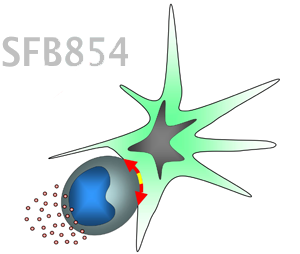The Deutsche Forschungsgemeinschaft (DFG) approved a continuation of the the Collaborative Research Center (SFB) 854, which has existed at the Otto-von-Guericke University (OvGU) since 2010. After a successful evaluation of the research group, the DFG described the work of the SFB 854 as excellent and approved a grant to the sum of 12.5 million Euro for 2018 to 2021. As a part of SFB 854, almost 90 scientists are performing research in 18 interdisciplinary subprojects related to the topic "Molecular Organisation of Cellular Communication within the Immune System".
Together, they are researching the molecular mechanisms responsible for signal processing during an immune response in the case of both healthy and sick organisms. Because a functional and precisely coordinated immune response is critical to defending against pathogens and to the elimination of cancer cells. In order to trigger and ensure a correct immune response, the many different types of cells of the immune system must communicate optimally with one another. To decode the complex communication mechanisms of the immune system, the researchers of the SFB 854 are using the newest biochemical, genetic and imaging techniques and constantly developing them, for instance within the overarching microscopy project.
The SFB 854 connects the expertise of the OvGU in the fields of immunology and neuroscience with researchers of the Leibniz Institute for Neurobiology in Magdeburg, the Helmholz Centre for Infection Research in Braunschweig, the Technical University Braunschweig, the Freien Universität Berlin, and the Albert-Ludwigs-Universität Freiburg, which all also participate in the consortium. For the third funding period, the SFB 854 added four new projects, which are primarily lead by early career researchers. Approximately 28 % of the researchers in the SFB are women, which was described as exemplary in the evaluation by the consortium.
The funding of scientific and doctoral development is very important to the SFB 854. During the second funding period, a sturctured training and qualification program for doctoral students in biology and medicine was established. This program has become well established and offers excellent opportunities to the 27 doctoral students participating in the 18 subprojects of the SFB. It will also be available in the third funding period. Young doctors who want to link their clinical experience with research can apply for Gerok positions, which provide the opportunity to focus completely on research for six to twelve months and form a basis for a career as a clinician scientist. In addition to the quality of reasearch, the various training programs of the SFB were also given excellent marks in the evaluation.
Prof. Dr. med. Burkhart Schraven, speaker for the SFB 854, vice dean for research for the medical faculty, and director of the Institue for Molecular and Clinical Immunologie emphasized "The approval of a third funding period is a fantastic result. The SFB 854 has developed enormously since its establishment in 2010 and the renewed funding allows us to reap the benefits from the basis that we have built over the past eight years. This also makes Magdeburg increasingly visible as a first rate location for immunological research. We also hope that the SFB 854 will make the Master's program in Immunology, established by the medical faculty two years ago, even more attractive. The M.Sc. Immunology students are very interested in research and a large and focused research group nearby offers many opportunities for a Master's and doctoral thesis!"
Prof. Dr. Thomas Fischer, a project leader in the SFB 854 and speaker for the Health Campus Immunology, Infectiology and Inflammation (GC-I³) also emphasized how important the SFB is for Magdeburg's role as a prime location for immunological research: "By creating the Health Campus in 2014, we created a basis that combined the immunological competence in the fields of patient care, training and research - and the SFB 854 is a critical part of the reasearch in the GC-I³"
In addition to the SFB 854, the process engineers of the OvGU also benefit from the approval of a third funding period for the SFB/Transregio 63 "InPROMPT: Integrated Chemical Processes in Fluid Multiphase Systems", which includes many projects at the Uni Magdeburg and has the goal of developing alternative production processes for chemical products. As a summary, "a magnificent success for the scientists involved as well as for scientific research in Sachsen-Anhalt", praised science minister Prof. Dr. Armin Willingmann.




